- Home
- Fredric Brown
The Far Cry Page 2
The Far Cry Read online
Page 2
"But why should you do it, Luke? At least, why shouldn't I come along?"
"And talk about a forbidden subject? Nix, my friend, remember that you don't know what real estate is. Relax and wrap yourself around a cold drink while I find out the facts."
Weaver wrapped himself around a cold drink. In half an hour Ashley was back, grinning. "You got yourself a house," he said. "For free."
"What do you mean, for free?"
"Well, the next thing to it, anyway. Wait a second; I'll get us some coffee; I don't want another drink because I want to do some more driving. Or would you rather have another Tom?"
"Coffee sounds good."
Ashley went into the bar and then came back and sat down across from Weaver. "Coffee coming up. Okay, here's the deal on the house. Price says he's been trying to sell the place and that the house and four acres are listed with him at two thousand bucks—but it's been marked that for eight years and no takers. Furniture—he says it's not anything fancy, but that it's usable—goes with it. That's if you want to buy it, and I told him you didn't."
"Right," Weaver said. "Now get to the 'for free' business you were talking about."
"Price wants somebody to live there for a while to break the jinx, as he puts it. He'll let you have it for the summer if you'll fix it up and live there. He says he thinks the few repairs the house itself will need shouldn't run over about fifty bucks to get the place fixed up livably. That sounds pretty cheap but you can get labor out there for three bucks or so a day.
"He guesses it'll cost you another fifty to get the furniture fixed up, and that you'll probably want to add a few pieces if two of you will be living there and that'll run you another fifty or a hundred bucks—unless you want to get fancy about it. But he says if you improve the place that much you can live there this summer—or as late into the fall as you want to—for free. He says he probably wouldn't rent or sell it this summer anyway so he's got nothing to lose and with that improvement to the place, plus the fact that the jinx has been broken by somebody's living there, he'll have a better chance of selling or renting it next year."
The coffee came. Weaver sipped his, looking up at the bright blue sky over the rim of his cup.
Ashley said, " I told him you 'd let him know by tomorrow."
"We can let him know today," Weaver said. "Maybe this Doughbelly Price—is there such a character, by the way, or are you kidding me?"
"It could happen only in Taos," Ashley said, "but there is such a character. And if you strain like that at a gnat, he has his office next to that of Jimmy Valentine, who is a public accountant. No, not kidding you."
"All right, I’ll believe you. What I started to say was that maybe this Doughbelly Price is crazy, but I’m not. I’m taking him up on that deal. As soon as we're through with this coffee."
"Good. I’ll go around with you, and after that I'll have to push on. I want to get to L. A. as soon as I can and if I can put another couple of hundred miles behind me before I hole in for the night, I’ll be that much closer."
Doughbelly Price was a little man in a big Stetson. He shook hands with Weaver and said, “Maybe I'm nuts for making you a deal like that, but I’ve been stuck with that joint for eight years. Maybe you can take the curse off of it.”
Weaver grinned at him. "What do I sign?"
"What do you want to sign anything for? I couldn’t read it anyway. Here's the keys. Go on out and fix it up and live there."
Weaver had himself a house.
He tried to talk Price into having a drink to seal the bargain, but Price said he had another appointment. He said, "Listen, Weaver, if you don’t know nobody around here, you’ll get yourself cheated less if you just get a contractor to do that fixing. Ellis DeLong, maybe. Unless you’re a contractor yourself and know the local angles you ain’t going to save yourself no money by hiring your own labor.”
After they left Doughbelly Price’s office Weaver had a little trouble persuading Luke Ashley to have one final drink for a stirrup cup before he left, but he finally prevailed. "All right," Luke said finally, "but better watch it yourself, George, in this altitude. Yes, you lived this high in Santa Fe, but not recently; you're used to Kansas City.”
They had the final drink together in the little bar of La Doña Luz.
Ashley said, "Listen, George, I've got an idea. Living right there where the Jenny Ames murder happened, you might get a chance to dig in on it—and you might find it interesting to do the digging. If you do, and can round up enough facts to let me write the case up-after my three months in Hollywood—I'll cut you in on the deal. My by-line, of course, because that'll make it sell quicker, but I'll give you a cut of the check, half or more, depending on how much of the work is yours and how much is mine. And the true detectives are paying good rates right now. You might get enough out of it to cover what fixing that house up is going to cost you-and that would make your rent for the summer really for free ."
"Nuts to Jenny Ames," Weaver said. "I'm out here to rest up, not to play detective on an eight-year-old murder case."
"All right, but sooner or later you’ll get bored resting and the idea might sound better to you. If you change your mind before the summer’s over, the deal stands. You might find it more interesting than you think. It was a Lonely Heart murder."
"What's a Lonely Heart murder?"
"That's one of the things you’ll find out when you start digging in. Well, George, I’ve really got to go. It was swell seeing you again.”
"Thanks for everything, Luke. And that was a good tag line you used just now; I will have to dig in enough to find out what the hell a Lonely Heart murder is. But no farther. I’m going to get myself some water colors and do some splashing around, and that’s as hard as I intend to work."
When Ashley had left, Weaver found Ellis DeLong in the phone book and talked to him on the phone. He learned that DeLong’s place was only half a block off the plaza and walked there.
He explained the deal he'd just made with Price.
“I know the house," DeLong said. “How much do you want done to it?"
"Whatever it needs – in reason. Mr. Price says fifty dollars ought to make it livable-in, outside of furniture. I’ll double that if I have to, but I’d just as soon not. How soon can you get at it?"
"Tomorrow, I think. Work is slack right now. I’ll send two men on the job and I doubt if it takes them more than a couple of days.”
"That’s fine,” Weaver said. "Until I can get in the place I’m staying at La Fonda—you can get in touch with me there if anything comes up."
He went back to his room at the hotel and wrote a letter to Vi. Not a long letter, nor an affectionate one. They'd passed that stage long ago, shortly after the birth of Betty, almost five years ago. It was for the sake of Ellen and Betty
He wrote:
Dear Vi,
I’ve taken a place in Taos, a bit out of town but not too far; it’s about twenty minutes' drive. It's a little primitive and isolated, but the scenery is marvelous and it’s a wonderful bargain for the summer. I hope you’ll like it. [She probably wouldn't, he thought; but then again he wished she weren’t coming] You can reach me General Delivery in Taos to let me know when you'll arrive. The train doesn’t come here, so buy your ticket to Santa Fe and I’ll drive down there—it's seventy miles—and pick you up to save you the bus ride. Give my love to Ellen and Betty and tell them that their daddy . . .
He walked up to the post office to mail the letter and then back to the hotel. He didn’t want another drink just yet; he wasn't hungry enough to eat; he didn’t want to go back up to his room. Nor did he want to look for someone to talk to; he didn’t quite know what he did want.
The sun was going down and the air was getting cool now.
He’d have to find something to do for the evening. There was only one movie in town, almost next door to his hotel, and only a Western was playing there. Occasionally, back home, he'd sit through a Western because Ellen was crazy about them
(he sometimes called her Hopalong Weaver) but he certainly wasn’t going to sit through one in any lesser cause.
Maybe reading would be the answer. He walked across the plaza to the drugstore and picked out a pocket book to read, a mystery.
He sat in the hotel lobby and tried to get interested in it, but it bored him. When he found that he’d read the same paragraph three times and still had got no meaning out of it, he put the book in his pocket and went out to walk. Maybe he could work up an appetite so he could eat and get eating over with; then he could go up to his room and stay there. Maybe, in pajamas and removed from the temptation to go out again, he could get interested in the book.
What, he wondered, was a Lonely Heart murder? Isn't every heart lonely, always?
Forget it. He walked.
After a while he found himself striding savagely across the evening. He forced himself to slow down.
The stars came out, and a bright moon, and a cool wind.
Chapter Two
In the morning it was raining hard. From his window Weaver could scarcely see across the plaza, let alone the distant mountains that had been so incredibly beautiful in sunlight. He closed the window and got back into bed, cursing himself for having got drunk the night before. Stinking drunk and on a solitary jag, sitting alone at a bar staring at his reflection in a blue-tinted backbar mirror, repelling with curt monosyllables the few who had tried to talk to him.
Why?
There was a bad taste in his mouth and he felt a great need for cold water. He went to the bathroom and drank two glasses of it. His hands were shaking so badly that he didn't care to risk shaving.
He knew he wouldn’t be able to go back to sleep so he dressed, a bit fumblingly, and went downstairs to the coffee shop, The thought of food was abhorrent to him but he forced himself to eat some buttered toast with the two cups of coffee that he drank.
He felt a little better then, although his hand still trembled when he held it out and looked at it. (Making sure first, of course, that no one was watching him.) He’d either have to quit drinking so much or learn how to use an electric razor, much as he disliked one.
He solved the problem for the moment by getting shaved in the barbershop a few doors away. It was still raining moderately hard but portals made a porch-like roof over the sidewalks almost all the way around the plaza, so he didn't get wet.
The rain was a mere drizzle by the time he'd had his shave. He was able to walk to where he’d parked his car on a street off the plaza. He drove out the Denver road and turned off at the side road to Arroyo Seco. His Chevvie skidded dangerously and he saw that the road ahead was a sea of mud. He fought the skid and stopped the car slowly and carefully. He wondered if he should try to go on and remembered how much worse parts of the dirt road past Seco were than this section of it; surely they were impassable. Cautiously he backed out onto the asphalt main road and drove back to Taos. Living out there on a dirt road had been a mad idea. He'd go to DeLong and cancel the deal for fixing up the house, then give the keys back to Price. He hadn’t as yet any investment—unless it was half a day’s time—in the place.
DeLong was glad to see him. "A bit wet this morning." he said. "But I’ve got three men working on your place; they went out there early."
"You mean they made it over that road—or wasn’t it so bad then?"
"Oh, it may be a little worse by now than it was earlier, but this is the first rain we’ve had in two weeks so it can’t be so bad. You'll get used to a little mud once in a while and it doesn’t happen often.”
“But—“
"I'm free now. Want to go out there with me and see how things are coming along? We can talk over any doubtful points—things we might not be sure whether you’d want done or not."
Weaver nodded. If things weren't too far along, if his investment wasn’t too big, he could still cancel it. The rain had stopped.
DeLong's station wagon had no special tires but he made the road easily. He said, "We’ll still have a few rains, but not many. Possibly for the next month there'll be about a day a week when the road will be a bit slippery and you'll have to drive slowly, but you can make it. There’s a knack to driving in mud. And we’ll have nine-tenths good weather from here on in; there’s nothing to worry about."
The three men—one an Anglo, the other two Spanish Americans—had knocked off for lunch when they got there. DeLong and the Anglo carpenter went over the place with Weaver, discussing what had been done and what should still be done. DeLong told Weaver, "Doughbelly's guess of fifty dollars wasn't bad. Not much material needed—a few new boards and nails, two panes of glass, some plaster patch. I think they can finish today and that about forty or forty-five dollars will cover it. Unless you want a fancy job."
"No, I don’t want a fancy job," Weaver said.
The next day the sun was out and the road, although badly rutted, was almost dry.
The workmen had finished. Weaver looked over his domain and found it good—but greatly in need of cleaning. He drove the mile and a half back to Arroyo Seco in search of help. He inquired at the general store and was directed to a Spanish couple named Sanchez who were willing, for five dollars, to spend the afternoon cleaning. He drove them out to the house and left them there, after inventorying the furniture and other contents to decide what things he’d need right away. He drove into Taos and spent the afternoon picking up a few pieces of used furniture, some dishes and cooking implements and some bedding. He got back at five o'clock with all the smaller items in his car—two heavier pieces would be sent out by truck the next day.
The Sanchezes were just finishing. They’d done a good job and the place looked livable-in.
“I'll drive you back," he told them, “soon as I bring in the rest of the stuff from the car."
Sanchez gave him a hand with the carrying. He asked, "You buy this place, Mister Weaver? Or you just rent, huh?"
"Just renting. That is, I'm paying rent for the summer by getting the place fixed up."
"You live here alone, huh?"
Weaver explained that his wife would be joining him soon.
"Good," Sanchez nodded emphatically. "After what happened it would be bad to live alone here, Mister Weaver. My boy Pepe, he saw it, he saw the start of it.”
"Saw—you mean he saw the murder?"
"Pepe, he saw him go for her, Mister Weaver, with the knife. Through that window Pepe saw it. He had been fishing up the arroyo—”
Weaver said, "Well, that’s all the stuff out of the car. Come on; I’ll take you home."
As the car crossed the little bridge and turned onto the road, Sanchez pointed back. "Right from here Pepe saw it, in that window, Pepe saw her back away to the door and the other after her with the knife, the man who lived here, Nelson. Then she got through the door and ran and Pepe could not see any more."
“He didn’t try to help her, or get help?"
"Help her, Mister Weaver? Pepe he was only ten, only a boy. He came home and told me. I go to the store and talked on the telephone for the sheriff in Taos and he came, but I don't think he believed my Pepe. He went out to the house and he look around but find nobody home and no signs anything happen. He told Pepe that he see things. It was only when they find her body two months after back in the hills they know what Pepe told them was true."
After he’d taken the Sanchezes home, Weaver hesitated briefly deciding whether to return to Taos for the night or whether to pick up some groceries at the little store in Arroyo Seco and take them back to the house. Then he remembered that his clothes and toilet articles were still at the hotel and that, anyway, he was past check-out time at the hotel and wouldn’t save any money by not staying there for the night. Besides, he had nothing to read, nothing to do at the house.
He moved the next day and laid in a supply of food. Not that he intended to do any great amount of cooking for himself; until Vi got there he’d have one meal a day in Taos, but he’d manage to make himself coffee in the morning and to fix himself s
ome kind of a lunch. He laid in a stock of magazines and pocket books. He wanted to buy paints and paper but it was Sunday and he couldn’t find any place open that sold artists' supplies.
The next day was beautiful again. Right after a late breakfast he drove into Taos and found a place called the Kiva where he could buy water colors and suitable paper. He intended to take literally the doctor’s suggestion that he try painting; he’d never seriously tried it before but he had a knack for drawing and thought that with a little practice at handling colors he might not do too horribly.
He tried painting as soon as he got home and found that he enjoyed it, although it began to bore him after an hour or so. He read some, and he looked at the mountains. He even walked back toward them perhaps a quarter of a mile, and that made him think of Jenny Ames, one night eight years ago. This was how far from the house her body had been found—after a quarter-mile run through the night with a killer at her heels.
The night that followed was cool and, again, he couldn’t seem to concentrate on reading. He drove into Seco and tried the tavern there. He was the only Anglo in the place and all the conversation was in Spanish. He was used to the sound of Spanish—he’d lived a long time in Santa Fe but he’d never learned to speak it or understand it. That didn’t matter tonight because he hadn’t wanted to talk to anybody anyway. But there was something wrong with the atmosphere or was he imagining a vague hostility that wasn’t there? And he kept wondering whether they were talking about him—not that he cared if they did, but he couldn’t help wondering.
After a while he bought a bottle from the backbar and drove home with it. He drank himself into a sullen stupor and went to bed, well before midnight.
In the morning he woke early and couldn’t get back to sleep, although he felt lousy, too lousy even to make breakfast for himself. Was this what he’d come to Taos for? The doctor back home had made no objection to moderate and occasional drinking, but this made two nights out of five that he’d gone to bed drunk and that couldn't be good for him, physically or mentally. The doctor had told him that the heavy drinking that had preceded his breakdown had been a symptom and not a cause, but if he kept on—

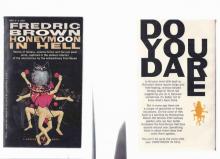 Hall of Mirrors
Hall of Mirrors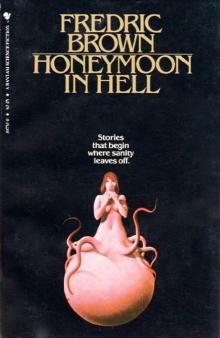 Honeymoon in Hell
Honeymoon in Hell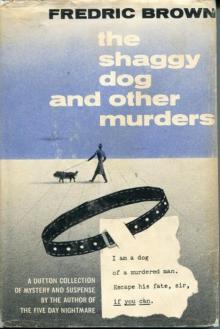 The Shaggy Dog and Other Murders
The Shaggy Dog and Other Murders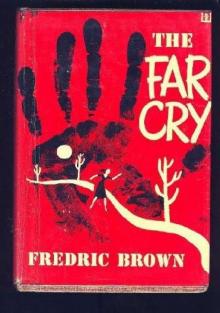 The Far Cry
The Far Cry Arena
Arena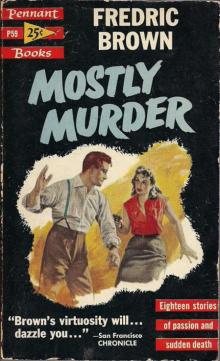 Mostly Murder
Mostly Murder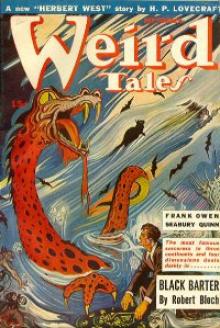 The Geezenstacks
The Geezenstacks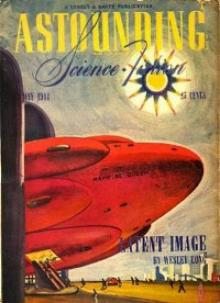 The Yehudi Principle
The Yehudi Principle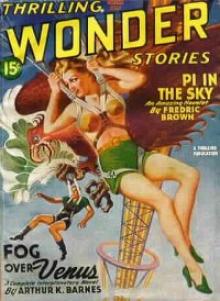 Pi in the Sky
Pi in the Sky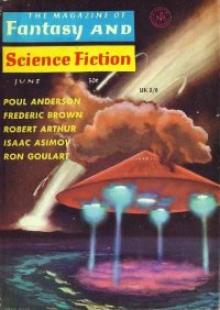 Eine Kleine Nachtmusik
Eine Kleine Nachtmusik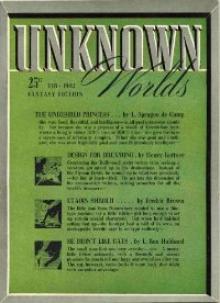 Etaoin Shrdlu
Etaoin Shrdlu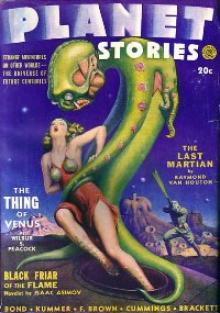 The Star Mouse
The Star Mouse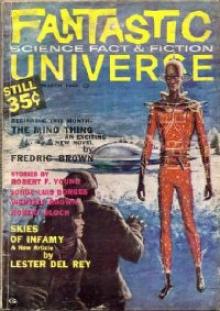 The Mind Thing
The Mind Thing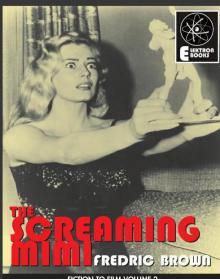 The Screaming Mimi
The Screaming Mimi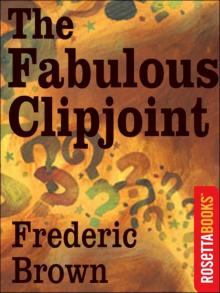 The Fabulous Clipjoint
The Fabulous Clipjoint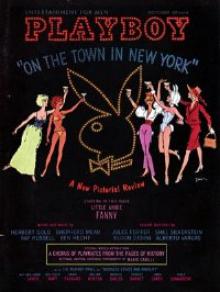 Puppet Show
Puppet Show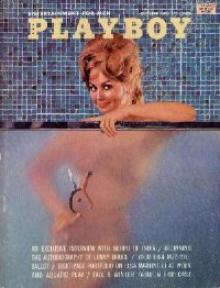 It Didn't Happen
It Didn't Happen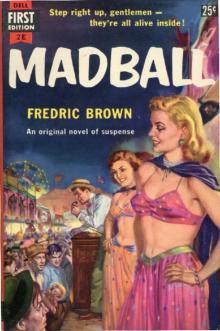 Madball
Madball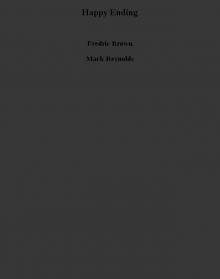 Happy Ending
Happy Ending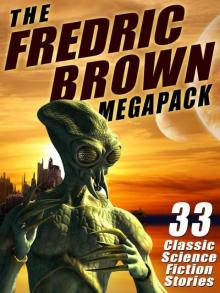 The Fredric Brown Megapack: 33 Classic Science Fiction Stories
The Fredric Brown Megapack: 33 Classic Science Fiction Stories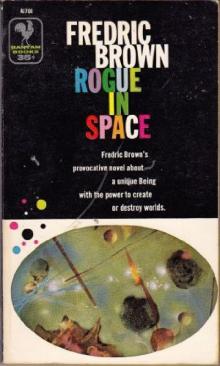 Rogue in Space
Rogue in Space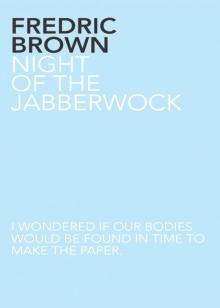 Night of the Jabberwock
Night of the Jabberwock The Dead Ringer
The Dead Ringer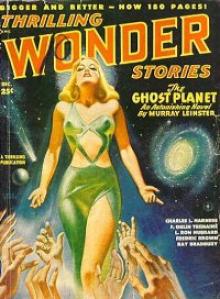 Knock
Knock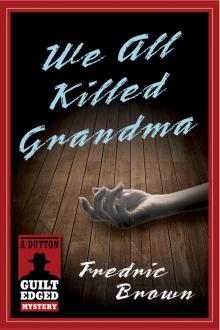 We All Killed Grandma
We All Killed Grandma Space On My Hands
Space On My Hands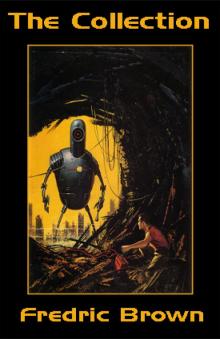 The Collection
The Collection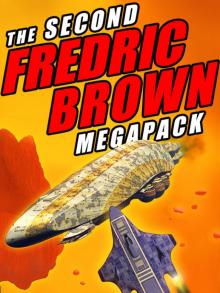 The Second Fredric Brown Megapack: 27 Classic Science Fiction Stories
The Second Fredric Brown Megapack: 27 Classic Science Fiction Stories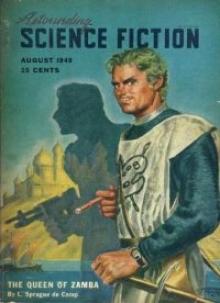 Letter to a Phoenix
Letter to a Phoenix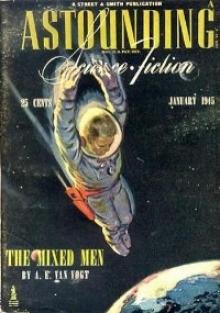 The Waveries
The Waveries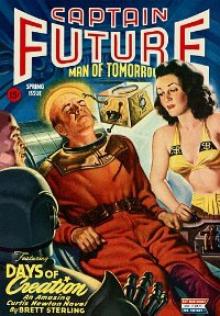 Nothing Sirius
Nothing Sirius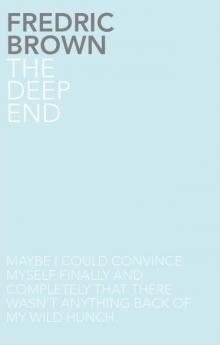 The Deep End
The Deep End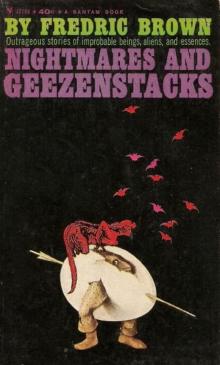 Nightmares & Geezenstacks
Nightmares & Geezenstacks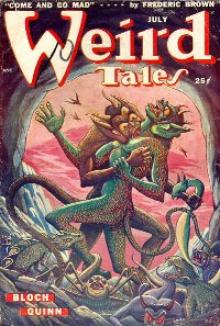 Come and Go Mad
Come and Go Mad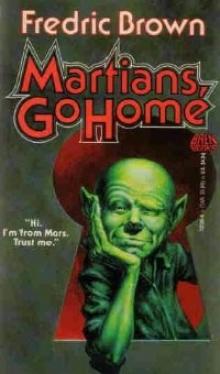 Martians, Go Home
Martians, Go Home